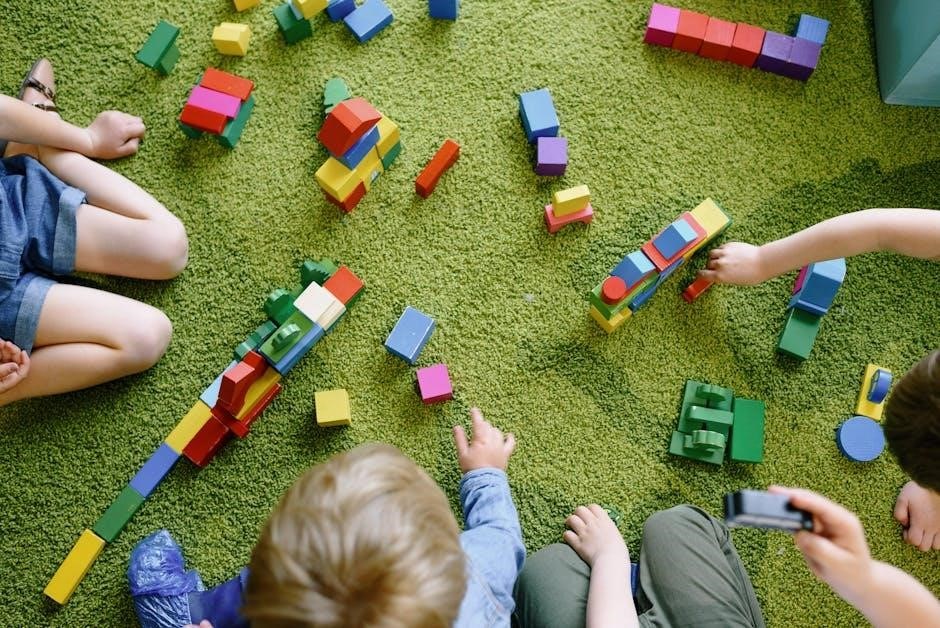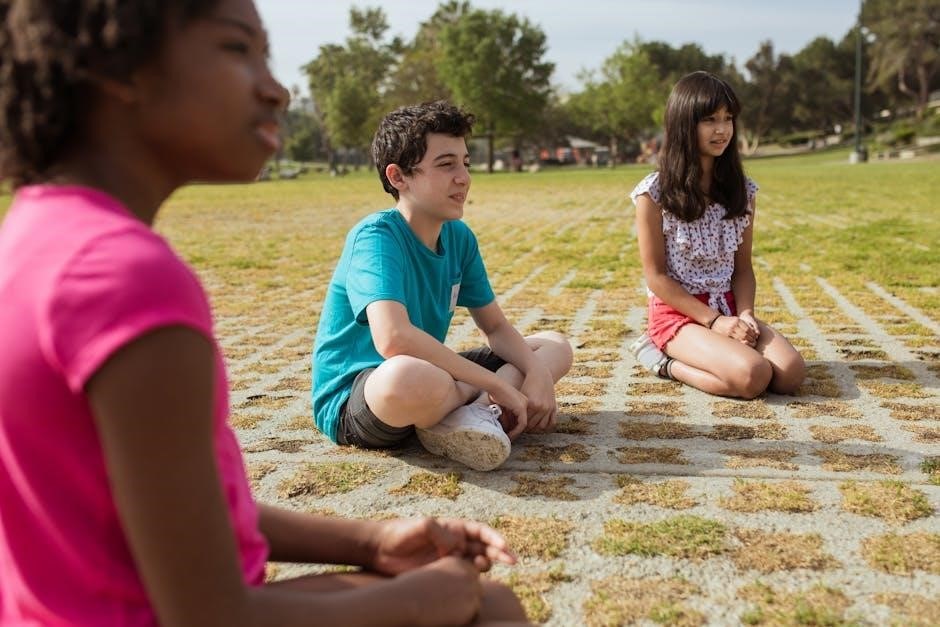Social-Emotional Learning (SEL) is essential for developing self-awareness, emotional intelligence, and interpersonal skills in individuals. It fosters personal and academic growth through interactive activities. Free SEL resources, including PDF worksheets and guides, are widely available online, offering educators and parents accessible tools to promote social-emotional development.
What is Social-Emotional Learning?
Social-Emotional Learning (SEL) is a process that helps individuals develop essential life skills, such as self-awareness, emotional intelligence, and social skills. It focuses on fostering personal and academic growth by teaching kids and teens to understand and manage emotions, set goals, and build healthy relationships. SEL is implemented through activities, discussions, and reflections that promote empathy, self-regulation, and responsible decision-making. These skills are crucial for navigating challenges in school and life. By integrating SEL into daily routines, educators and parents can support children in developing a strong foundation for long-term success and well-being. SEL activities are often available as free PDF resources, making them accessible to everyone.
Why is SEL Important for Children and Teenagers?
Social-Emotional Learning (SEL) is crucial for children and teenagers as it equips them with essential life skills, fostering emotional intelligence and social competence. By teaching self-awareness, self-regulation, and empathy, SEL helps young individuals navigate challenges, build positive relationships, and achieve academic success. It also supports mental health by addressing issues like anxiety and low self-esteem. Through free PDF resources, educators and parents can access activities that promote resilience, kindness, and responsible decision-making. These tools empower children and teenagers to thrive in school and beyond, laying a foundation for lifelong personal and professional growth. SEL is vital for helping young people develop into confident, compassionate, and capable individuals.

Benefits of Social-Emotional Learning Activities
Social-Emotional Learning activities boost emotional growth, resilience, and well-being, fostering positive relationships and improving academic performance in children and teenagers.
Improving Emotional Intelligence
Emotional intelligence is crucial for understanding and managing emotions, fostering empathy, and building strong relationships. Social-Emotional Learning (SEL) activities, such as journaling and mindfulness exercises, help children recognize and regulate their feelings. Free PDF resources offer guided prompts and worksheets that encourage self-reflection and awareness. These tools are designed to enhance emotional intelligence by providing practical, age-appropriate exercises. By engaging in these activities, students develop skills like self-awareness, self-regulation, and empathy, which are vital for personal and academic success. Teachers and parents can easily access these materials to support emotional growth in children and teenagers.
Enhancing Social Skills
Social-Emotional Learning (SEL) activities play a vital role in enhancing social skills, helping students communicate effectively and build positive relationships. Free PDF resources provide engaging exercises like role-playing, group discussions, and conflict resolution scenarios. These activities encourage collaboration, empathy, and active listening, essential for fostering a supportive environment. By participating in these exercises, children and teenagers develop the ability to navigate social challenges confidently. Educators and parents can utilize these downloadable materials to create interactive learning experiences that promote social competence and lifelong interpersonal success.
Boosting Self-Esteem and Confidence
Social-Emotional Learning (SEL) activities are designed to help individuals develop a positive self-image and build confidence. Free PDF resources offer a variety of exercises, such as positive affirmations, self-reflection prompts, and confidence-building tasks. These tools empower children and teenagers to recognize their strengths and overcome self-doubt. By engaging in these activities, students learn to set realistic goals, celebrate achievements, and develop resilience. Educators and parents can use these downloadable materials to create a nurturing environment that fosters self-belief and encourages personal growth. Boosting self-esteem through SEL activities is a powerful way to help individuals thrive academically and socially.
Free SEL Activities for Different Age Groups
SEL activities are tailored for elementary, middle, and high school students, ensuring age-appropriate development. Free PDF resources offer engaging exercises for each group, fostering emotional growth and social skills.
SEL Activities for Elementary School Students
Elementary school students benefit from engaging SEL activities that promote emotional intelligence and social skills. Free PDF resources include calm-down bins, fidgets, and sensory bottles to help manage emotions. Worksheets and exercises focus on self-awareness, kindness, and cooperation. Activities like storywriting with silly opposites encourage creativity while teaching empathy. Mindfulness exercises, adapted from DBT principles, help young students regulate emotions. Group games and interactive lessons foster collaboration and conflict resolution. These age-specific activities ensure foundational skills are developed through fun and accessible learning experiences, preparing students for future challenges.
SEL Activities for Middle School Students
Middle school students benefit from SEL activities that focus on emotional growth and social competence. Role-playing and project-based learning enhance empathy and teamwork. Free PDF resources, such as the Resilience Workbook for Teens, offer structured exercises to develop self-awareness and self-regulation. Group discussions and problem-solving tasks encourage collaboration and conflict resolution. These activities help students navigate adolescence by fostering confidence and emotional intelligence, preparing them for real-world challenges while promoting positive relationships and academic success.

SEL Activities for High School Students
High school students benefit from advanced SEL activities that focus on critical thinking and real-world application. Group projects, debates, and reflective journaling foster empathy and self-awareness. Free PDF resources, such as the Resilience Workbook for Teens, provide exercises to manage stress and build confidence. Peer discussions on mental health and goal-setting encourage open communication and problem-solving. These activities prepare students for independence by enhancing emotional intelligence, decision-making, and interpersonal skills. Educators and parents can access these tools to support teenagers in navigating challenges and developing a strong sense of identity and purpose.

Popular Types of SEL Activities
Popular SEL activities include journaling, group discussions, and mindfulness exercises. These tools enhance emotional intelligence, foster empathy, and promote self-awareness, offering practical ways to support personal growth and social skills.
Journaling and Reflection Prompts
Journaling and reflection prompts are powerful tools for fostering self-awareness and emotional intelligence. These activities encourage students to explore their thoughts, feelings, and experiences through writing. Free PDF resources offer a variety of prompts tailored to different age groups, such as gratitude journals, emotional check-ins, and goal-setting exercises. Journaling helps students process emotions, develop empathy, and gain insights into their behaviors. Reflection prompts also support critical thinking and problem-solving skills. Educators and parents can easily access these printable worksheets, making SEL integration seamless. By combining writing with mindful reflection, these activities empower students to grow emotionally and socially, preparing them for lifelong success.
Group Discussions and Morning Meetings
Group discussions and morning meetings are effective social-emotional learning activities that foster collaboration, empathy, and communication. These activities encourage students to share thoughts, listen actively, and build connections. Free PDF resources offer discussion prompts and meeting guides tailored for various ages, focusing on topics like kindness, teamwork, and problem-solving. Morning meetings create a sense of community, while group discussions help students practice expressing themselves and understanding others. Educators can use these tools to promote a positive classroom environment and support students’ emotional and social growth. These activities are simple to implement and highly engaging, making them ideal for daily routines or special events.
Mindfulness and Calm-Down Activities
Mindfulness and calm-down activities are powerful tools for teaching emotional regulation and self-awareness. These practices help students manage stress, focus, and respond thoughtfully to challenges. Free PDF guides provide step-by-step instructions for creating calm-down bins, sensory bottles, and mindfulness exercises. Activities like deep breathing, visualization, and reflection encourage students to explore their emotions and develop self-control. Educators can integrate these resources into daily routines or use them as needed to support students’ emotional well-being. Mindfulness practices not only improve emotional resilience but also foster a positive classroom environment, helping students stay grounded and focused throughout the day;

Tools and Resources for SEL
Discover a variety of free SEL tools, including PDF worksheets, guides, and interactive exercises. These resources help educators and parents foster emotional growth and social skills effectively.
Free Printable Worksheets and Handouts
Free printable worksheets and handouts are invaluable resources for teaching social-emotional learning. These materials, available in PDF format, cover topics like emotional intelligence, self-awareness, and social skills. Worksheets often include activities such as journaling prompts, self-assessment exercises, and scenarios to discuss emotions and behaviors. Many educators and parents rely on platforms like Teachers Pay Teachers (TPT) and Mylemarks for curated, age-appropriate materials. Additionally, websites offer printable SEL activities designed to address specific challenges, such as anxiety or self-esteem. These tools are easily accessible, making it simple to incorporate SEL into daily routines or classroom lessons. They provide engaging and effective ways to support emotional growth in children and teenagers.

SEL Games and Interactive Exercises
SEL games and interactive exercises are dynamic tools for fostering social-emotional growth. Activities like role-playing, group discussions, and mindfulness exercises encourage teamwork and self-reflection. Interactive games such as “Calm-Down Bin” activities and sensory exercises help students manage emotions. Many resources offer printable PDFs with step-by-step guides for these exercises, making them easy to implement. These engaging methods allow children to practice social skills, empathy, and problem-solving in a fun, collaborative environment. Educators and parents can download these activities for free, ensuring accessible learning opportunities for all ages. They provide a hands-on approach to teaching essential life skills and emotional intelligence.
PDF Workbooks and Guides for Educators
PDF workbooks and guides provide educators with structured tools to implement SEL effectively. These resources often include lesson plans, activity instructions, and assessment techniques. Free downloadable guides cover topics like emotional intelligence, self-awareness, and social skills. Many workbooks are designed for specific age groups, ensuring relevance and effectiveness. They also offer adaptable activities, allowing educators to tailor content to diverse classroom needs. These resources empower teachers to create supportive learning environments, fostering students’ emotional and social development; By leveraging these guides, educators can seamlessly integrate SEL into their curriculum, promoting holistic student growth. Additionally, the PDF format ensures easy access and sharing among professionals.

Implementing SEL in the Classroom
Educators can integrate free SEL PDF resources into daily lesson plans, creating engaging and structured activities that promote emotional intelligence and social skills in the classroom environment.
Integrating SEL into Daily Routines
Embedding SEL activities into daily classroom routines enhances emotional intelligence and social skills. Teachers can use free PDF resources, such as reflection prompts and mindfulness exercises, to create structured moments for self-awareness and collaboration. Morning meetings, journaling, and calm-down bins are practical strategies to foster a supportive environment. These activities, often requiring minimal preparation, encourage students to practice empathy, self-regulation, and communication. By incorporating SEL into daily schedules, educators promote consistency and reinforce positive behaviors, ensuring students develop essential life skills naturally and effectively.

Using SEL Activities as Homework or Extra Practice
Assigning SEL activities as homework or extra practice reinforces learning beyond the classroom. Free PDF resources, such as reflection journals and self-care lists, provide students with tools to practice emotional intelligence at home. Parents can engage by guiding discussions on empathy or resilience, fostering a collaborative environment; These activities, like mindfulness exercises or kindness challenges, encourage consistent skill development. By integrating SEL into homework, educators ensure students apply these skills in real-life situations, promoting long-term personal growth and emotional well-being. This approach also strengthens the connection between school and home, creating a unified support system for students’ development.
Assessment and Progress Tracking
Effective assessment and progress tracking are crucial in SEL. Utilize free PDF worksheets, journals, and reflection prompts to monitor emotional growth. These tools help evaluate social skills development and provide insights for personalized support.
Evaluating Student Participation and Engagement
Evaluating student participation and engagement in SEL activities is vital for understanding their progress. Use free PDF worksheets, journals, and reflection prompts to assess involvement. Observe students during group discussions, role-playing, and mindfulness exercises to gauge their engagement. Track participation through checklists, logs, and self-assessment tools. These methods help identify students who may need additional support. Encourage students to reflect on their own growth, fostering a sense of ownership. Regular feedback from educators and peers can also provide insights. By monitoring engagement, educators can adapt activities to meet diverse needs. This approach ensures a comprehensive understanding of each student’s social-emotional development, aligning with learning goals and fostering continuous improvement in a supportive environment.
Monitoring Emotional and Social Development
Monitoring emotional and social development involves tracking students’ progress through observations, feedback, and assessments. Use free PDF resources like checklists, journals, and reflection prompts to evaluate growth. Observe behavior during group activities, role-playing, and mindfulness exercises to identify improvements. Regularly review student worksheets and participation in discussions to assess emotional intelligence and interpersonal skills. Provide constructive feedback to guide further development. By consistently monitoring progress, educators can identify areas needing support and adapt activities to foster holistic growth. This ongoing process ensures students receive tailored guidance, promoting their emotional and social well-being effectively. Continuous monitoring helps create a supportive and inclusive learning environment.

Cultural and Individual Considerations
Cultural and individual differences are key when implementing SEL activities. Free PDF resources offer adaptable tools to meet diverse needs, ensuring inclusivity and cultural sensitivity in learning.

Adapting Activities for Diverse Student Needs
Adapting SEL activities ensures inclusivity and effectiveness for all students. Free PDF resources provide flexible tools to cater to diverse learning styles and cultural backgrounds. Educators can modify activities by incorporating visual aids, hands-on exercises, or group discussions to engage different learners. For example, mindfulness exercises can be adapted for students with sensory sensitivities by offering alternative calming strategies. Additionally, culturally responsive practices encourage students to share perspectives, fostering empathy and understanding. Printable worksheets and interactive games are easily customizable to meet individual needs, ensuring every student benefits from SEL. These adaptable resources empower educators to create a supportive learning environment for all.
Incorporating Cultural Awareness into SEL
Cultural awareness is vital in SEL, fostering an inclusive environment where diverse perspectives are valued. Free PDF resources offer activities that celebrate different cultures, encouraging empathy and understanding. Educators can integrate stories, traditions, and languages from various backgrounds into lessons. For instance, group discussions on cultural traditions or role-playing activities that explore global social norms can enhance students’ appreciation of diversity. Printable worksheets and interactive exercises help students reflect on their own cultural identities while respecting others. Incorporating cultural awareness into SEL not only enriches students’ emotional intelligence but also builds a harmonious, inclusive community. These resources make cultural integration accessible and meaningful for all learners.
Social-emotional learning activities, supported by free PDF resources, empower individuals to thrive emotionally and socially. By fostering empathy, self-awareness, and cultural understanding, SEL promotes lifelong growth and well-being.
The Impact of SEL on Long-Term Development
Social-emotional learning activities, supported by free PDF resources, have a profound impact on long-term development. They foster emotional intelligence, resilience, and interpersonal skills, shaping individuals into empathetic and responsible adults. By addressing challenges like anxiety and self-esteem, SEL equips children with tools for lifelong success. Accessible resources, such as workbooks and games, ensure sustained growth. These activities adapt to diverse needs, promoting cultural awareness and inclusivity. The result is a stronger foundation for personal and academic achievement, empowering individuals to navigate life’s complexities with confidence and compassion.
Encouraging Continuous Learning and Growth
Free PDF resources for social-emotional learning activities play a crucial role in encouraging continuous learning and growth. These tools, designed for various age groups, offer engaging exercises that help individuals develop emotional intelligence and resilience. By incorporating activities like journaling and mindfulness, educators and parents can foster a culture of self-improvement. Printable worksheets and interactive games provide accessible ways to reinforce social-emotional skills, ensuring sustained development. This approach not only enhances personal growth but also prepares individuals to adapt to future challenges, promoting a lifelong commitment to learning and emotional well-being.



